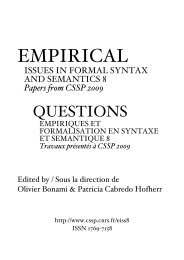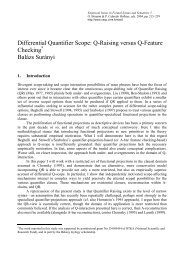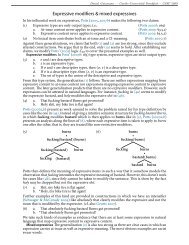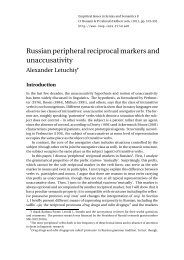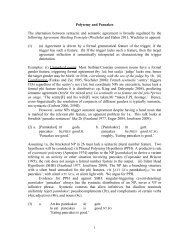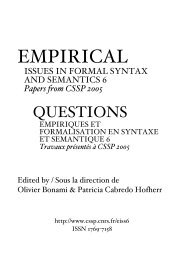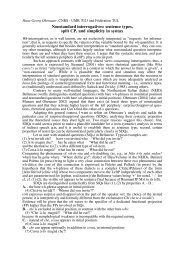Empirical Issues in Syntax and Semantics 9 (EISS 9 ... - CSSP - CNRS
Empirical Issues in Syntax and Semantics 9 (EISS 9 ... - CSSP - CNRS
Empirical Issues in Syntax and Semantics 9 (EISS 9 ... - CSSP - CNRS
Create successful ePaper yourself
Turn your PDF publications into a flip-book with our unique Google optimized e-Paper software.
Speaker endorsement We have discussed the versions of the ORDERING SOURCE AF-<br />
FIRMATION PRINCIPLE offered <strong>in</strong> Schwager 2006 <strong>and</strong> <strong>in</strong> Kaufmann & Schwager 2009 <strong>in</strong> §2.2.<br />
In Kaufmann (2012:162), the author proposes a quite different formulation, comb<strong>in</strong><strong>in</strong>g it with<br />
the ORDERING SOURCE RESTRICTION. The new constra<strong>in</strong>t makes reference to a salient decision<br />
problem, represented as a partition of the set of possible worlds.<br />
(44) [E]ither (i) <strong>in</strong> c there is a salient decision problem ∆(c) ⊆ ℘(W) such that <strong>in</strong> c the<br />
imperative provides an answer to it, g is any prioritiz<strong>in</strong>g order<strong>in</strong>g source, <strong>and</strong> speaker<br />
<strong>and</strong> addressee consider g the relevant criteria for resolv<strong>in</strong>g ∆(c); or else, (ii) <strong>in</strong> c there<br />
is no salient decision problem ∆(c) such that the imperative provides an answer to it <strong>in</strong><br />
c, <strong>and</strong> g is speaker bouletic.<br />
This formulation is disjunctive <strong>and</strong> relies on the rather unclear notion of the speaker consider<strong>in</strong>g<br />
‘g as the relevant criteria for resolv<strong>in</strong>g ∆(c)’. We don’t th<strong>in</strong>k that it solves the basic problem, <strong>in</strong><br />
any case. Either consider<strong>in</strong>g g the relevant criteria entails that the speaker wants these criteria to<br />
be used, <strong>in</strong> which case (44) is subject to Kaufmann’s own criticism of preference-based accounts<br />
of imperatives; or it is read <strong>in</strong> a weaker way, <strong>in</strong> which case it does not solve the #but I don’t want<br />
you to do it problem. F<strong>in</strong>ally, as Kaufmann herself po<strong>in</strong>ts out, this version does not account for<br />
concessive uses, where different k<strong>in</strong>ds/strengths of preferences appear to be at play.<br />
We conclude that even though Kaufmann’s various versions illum<strong>in</strong>ate the extent <strong>and</strong> complexity<br />
of the problem, none of her versions of the pr<strong>in</strong>ciple ends up resolv<strong>in</strong>g the tension of<br />
speaker endorsement <strong>in</strong> a fully satisfactory manner.<br />
S<strong>in</strong>cerity If (42) is commonly presupposed, an imperative utterance cannot be challenged<br />
as mistaken. However, as noted <strong>in</strong> §2.3, imperatives can also not be challenged as lies, someth<strong>in</strong>g<br />
that is always possible with utterances of declaratives (modal or not), even when the speaker is<br />
taken to have privileged epistemic access to their truth. Hence, Kaufmann’s account does not<br />
predict automatic s<strong>in</strong>cerity. In cooperative scenarios, she can rely on a pragmatic pr<strong>in</strong>ciple rul<strong>in</strong>g<br />
out <strong>in</strong>s<strong>in</strong>cerity, but the possibility of ly<strong>in</strong>g crucially <strong>in</strong>volves contexts with limited cooperation.<br />
She argues that there are cases of <strong>in</strong>s<strong>in</strong>cere imperatives, <strong>in</strong>volv<strong>in</strong>g examples of mislead<strong>in</strong>g advice.<br />
As we argued <strong>in</strong> §3.4.1, these <strong>in</strong>volve a false implication, not a false imperative utterance.<br />
Interlocutors’ <strong>in</strong>volvement Kaufmann’s account does not predict that the speaker of an<br />
imperative, with his utterance, <strong>in</strong>dicates that his <strong>in</strong>volvement <strong>in</strong> the realization of the content<br />
is to be m<strong>in</strong>imized. Given that the allowable order<strong>in</strong>g sources for the imperative modal <strong>in</strong>clude<br />
‘what the speaker desires’, ‘what the addressee desires’, <strong>and</strong> ‘what the goals of the addressee<br />
are’, it is unclear how the account would exclude an order<strong>in</strong>g source that is constituted by the<br />
speaker’s plans or <strong>in</strong>tentions. But then it should be possible to utter Be at the airport at noon! as<br />
a promise that the speaker will do everyth<strong>in</strong>g <strong>in</strong> his power to ensure the addressee will be at the<br />
airport at noon, someth<strong>in</strong>g that, as we have po<strong>in</strong>ted out <strong>in</strong> §1, is impossible.<br />
The account also predicts that wish uses are more generally available than they actually<br />
are. Given that the order<strong>in</strong>g source of the imperative modal can be ‘what the speaker desires’,<br />
a speaker should feel free to use imperatives to express any k<strong>in</strong>d of wish. However, as we have<br />
seen, wish read<strong>in</strong>gs are only possible if it is taken for granted that the addressee has no control<br />
over the realization of the content.<br />
53



